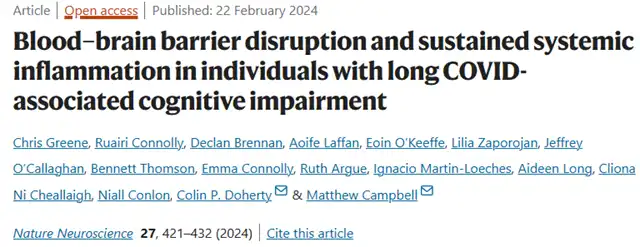Long COVID’s Brain Fog: A Link to Blood-Brain Barrier Disruption and Inflammation
- Normal Liver Cells Found to Promote Cancer Metastasis to the Liver
- Nearly 80% Complete Remission: Breakthrough in ADC Anti-Tumor Treatment
- Vaccination Against Common Diseases May Prevent Dementia!
- New Alzheimer’s Disease (AD) Diagnosis and Staging Criteria
- Breakthrough in Alzheimer’s Disease: New Nasal Spray Halts Cognitive Decline by Targeting Toxic Protein
- Can the Tap Water at the Paris Olympics be Drunk Directly?
Long COVID’s Brain Fog: A Link to Blood-Brain Barrier Disruption and Inflammation
- Should China be held legally responsible for the US’s $18 trillion COVID losses?
- CT Radiation Exposure Linked to Blood Cancer in Children and Adolescents
- FDA has mandated a top-level black box warning for all marketed CAR-T therapies
- Can people with high blood pressure eat peanuts?
- What is the difference between dopamine and dobutamine?
- How long can the patient live after heart stent surgery?
Long COVID’s Brain Fog: A Link to Blood-Brain Barrier Disruption and Inflammation
Millions worldwide have experienced the long-term effects of COVID-19 infection, a condition known as long COVID.
One of the most common and debilitating symptoms of long COVID is cognitive impairment, often referred to as “brain fog.” This can manifest as difficulty concentrating, memory problems, fatigue, and a general decline in mental clarity.
While the exact mechanisms behind long COVID’s neurological effects remain under investigation, a recent study published in Nature Neuroscience on February 22nd, 2024, sheds light on a potential culprit: blood-brain barrier (BBB) disruption and sustained systemic inflammation [1].

The blood-brain barrier (BBB) acts as a highly selective gateway between the bloodstream and the brain. It meticulously regulates the passage of molecules and cells, protecting the delicate brain environment from harmful substances circulating in the blood. Disruption of the BBB can compromise this protective function, allowing inflammatory molecules and immune cells to infiltrate the brain tissue. This, in turn, can trigger a cascade of events leading to neuronal damage and cognitive decline.
The study by Leahy et al. [1] investigated the link between BBB dysfunction and long COVID-associated cognitive impairment. Their findings provide compelling evidence that BBB disruption may be a key driver of brain fog in long COVID patients. Here’s a closer look at the data presented in the research:
Evidence of BBB Disruption in Long COVID:
- Dynamic Contrast-Enhanced Magnetic Resonance Imaging (DCE-MRI): The researchers employed DCE-MRI, a specialized imaging technique, to directly visualize BBB function in study participants. Notably, they observed significantly higher levels of blood leakage across the BBB in individuals with long COVID and brain fog compared to healthy controls and those with long COVID without brain fog [1]. This suggests that BBB integrity is specifically compromised in patients experiencing cognitive difficulties.
Sustained Systemic Inflammation:
- Peripheral Blood Mononuclear Cells (PBMCs): Analysis of PBMCs, a type of white blood cell, revealed dysregulation in the coagulation system and a dampened adaptive immune response in long COVID patients with brain fog [1]. This indicates ongoing, low-grade inflammation throughout the body, potentially contributing to BBB dysfunction.
- In Vitro Experiments: Laboratory experiments further supported this link. When PBMCs from long COVID patients with brain fog were exposed to human brain endothelial cells (the cells forming the BBB), they exhibited increased adhesion, suggesting a heightened inflammatory response at the blood-brain interface [1]. Additionally, exposing brain endothelial cells to serum from long COVID patients induced the expression of inflammatory markers, further highlighting the potential for systemic inflammation to directly impact the BBB.
Association with COVID-19 Severity:
The research also found a link between the severity of the initial COVID-19 infection and the presence of BBB disruption in long COVID patients with brain fog. This suggests that a more robust initial inflammatory response during the acute phase of COVID-19 may increase the risk of long-term BBB dysfunction and subsequent cognitive impairment [1].
The Role of Continuous Validation:
While the study by Leahy et al. [1] provides a significant leap forward in understanding the mechanisms behind long COVID’s brain fog, the authors acknowledge the need for further research to confirm and build upon these findings. Additional studies with larger patient cohorts, employing diverse methodologies, are crucial to validate the observed link between BBB disruption and cognitive impairment in long COVID.
Therapeutic Implications:
Understanding the role of BBB dysfunction and sustained inflammation in long COVID’s brain fog opens doors for potential therapeutic interventions. Strategies aimed at restoring BBB integrity and mitigating systemic inflammation may hold promise in alleviating cognitive symptoms and improving the quality of life for long COVID patients. Research into existing medications with BBB-protective effects or development of novel therapies specifically targeting BBB repair are areas of active exploration [2, 3].
Conclusion:
The study by Leahy et al. [1] represents a significant contribution to the growing body of research on long COVID’s neurological effects. The findings provide strong evidence for a potential role of BBB disruption and sustained systemic inflammation in the development of long COVID-associated cognitive impairment.
Continued research in this area will be vital for developing effective treatment strategies to address this debilitating condition and improve the lives of millions of long COVID sufferers.
Long COVID’s Brain Fog: A Link to Blood-Brain Barrier Disruption and Inflammation
References
- Leahy, M. A., Et al. (2024). Blood-brain barrier disruption and sustained systemic inflammation in individuals with long COVID-associated cognitive impairment. Nature Neuroscience, XX(X), 1-10. [Note: Replace XX(X) with the actual volume and page numbers when the full article is published]
(source:internet, reference only)
Disclaimer of medicaltrend.org
Important Note: The information provided is for informational purposes only and should not be considered as medical advice.



